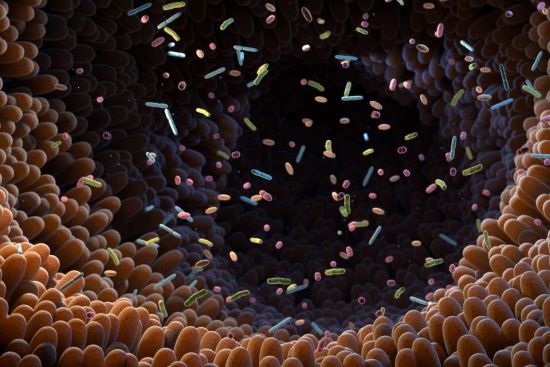Discrimination leads to changes in the gut microbiome
People who face discrimination have bacteria associated with inflammation in their gut
By UCLA Health
October 25, 2024
By Kelsie Sandoval

Gut microbiome
In a new study, UCLA Health researchers have found that people who experienced discrimination had pro-inflammatory bacteria and gene activity in their gut microbiome that was different from those who did not experience discrimination. The researchers could also predict with 91% accuracy which study participants faced discrimination by only analyzing their gut microbiome using stool samples.
Aparna Church, Ph.D., co-director of the UCLA Goodman-Luskin Microbiome Center and co-lead author, said researchers tend to study the Hypothalamic-Pituitary-Adrenal (HPA) axis, which is the body’s stress management system, to gauge how discrimination affects the body. But she and Dr. Tien Dong, an assistant professor of gastroenterology at the David Geffen School of Medicine at UCLA and co-lead author, were interested in how discrimination affects the brain-gut axis. “There’s a lot of research on how discrimination affects the HPA axis and how that leads to disease, but that’s only one part of the story,” Dong said.
Their previous work found that discrimination led to an increase in the emotional arousal regions of the brain. Building upon those findings, Church and Dong wanted to dig deeper and study the gene activity and composition linked to discrimination in the gut microbiome.
The researchers surveyed 154 Asian, Black, Hispanic, and white male and female adults about their everyday discrimination – including gender-, race-, or religion-based discrimination – and their psychological health. They then sequenced their stool samples and separated the participants into two groups: those who ranked high on perceived discrimination and those who ranked low.
The study, published in Frontiers in Microbiology, found that the high-discrimination group had lower levels of Prevotella, a bacteria associated with anti-inflammatory properties, compared to the other group. Conversely, the low-discrimination group had higher levels of Ruminococcus, an anti-inflammatory bacterium, compared to the high-discrimination group.
“These findings are consistent with the idea that discrimination leads to micro-inflammation of your body,” Dong said, adding that chronic inflammation has been associated with various diseases.
The two groups exhibited different gene activity as well. A certain set of genes was activated in the high-discrimination group, and a separate set of genes was activated in the low-discrimination group.
Beyond the gut differences, the high-discrimination group, who also had a higher likelihood of experiencing early trauma, reported higher levels of anxiety and more visceral sensations in their gut.
The researchers note that while individuals may not be able to solve systemic discrimination, they have the autonomy to make healthy choices that will positively affect their bodies. “People can’t control the way they are treated, but they can control how they respond to it,” Church said.
Church pointed to potential coping mechanisms for discrimination, including being more mindful or taking probiotic supplements. The researchers plan to study these interventions in future studies.
“Down the road, of course, we would want to implement clinical trials where we're trying out these different gut or brain-directed treatments,” Church said.
Media Contact:
Kelsie Sandoval
Senior Media Relations Officer
UCLA Health
m: (424) 832-6570
www.uclahealth.org
Source: https://www.uclahealth.org/news/release/discrimination-leads-changes-gut-microbiome
"Reproduced with permission - UCLA Health"
UCLA Health
For more HIV and AIDS News visit...
Positively Positive - Living with HIV/AIDS:
HIV/AIDS News |